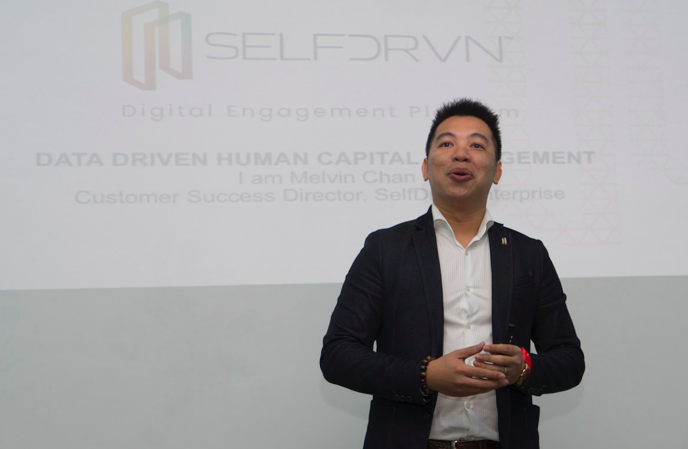MORE than ever before, companies are realising that good workplace culture is intertwined with employee retention and performance, which is integral to a company’s success. Selfdrvn, founded by Lam Mun Chong, offers a tech platform to improve employee engagement through gamification and communication.
According to its website, Selfdrvn’s product combines technology, psychology and process. At DNA’s inaugural SHIFT Business Tech Seminar 2018, the customer service director of Selfdrvn, Melvin Chan (pic) delivered a talk about problems faced by employers and how Selfdrvn can help solve these issues. “Especially for companies with over 100 employees, a lot of money is spent on recruitment to fill vacant positions,” Chan explains. He adds that companies pay about 30% of their total annual salary to recruiters for mid-level positions. “What we always tell our clients is that employee engagement saves cost and puts more money in your pocket,” he says. By increasing communication amongst employees, Selfdrvn enables them to create and work cohesively towards new objectives and projects. Not only does this give employees an increased sense of accomplishment, it also benefits the company’s bottom line. Chan believes, “Happy employees make happy customers and happy customers make happy stakeholders. Having employees who are engaged will drive productivity, revenue growth and profitability.”
Contrary to popular belief, salary is not the number one factor behind employees leaving a company. “Employee engagement has been made famous because of millennials entering the workforce. Because of technology and social media, millennials want fast feedback and improvement instead of waiting for yearly performance reviews.”
At Selfdrvn, Chan says that they pay attention to young employees in the company for ideas to move the company forward. He advises, “Eventually the younger generation are going to be the biggest consumers in the market. It makes sense to listen to them.”
Although companies may produce great products, the main driver of success is the people that make up an organisation. “In this world of tech, it is difficult to maintain a competitive edge with your product. It doesn’t take long for a competitor to come about and develop a similar product. It is your employees that set you apart from the rest.”
Traditional companies work with a hierarchical system with a few employees working under the authority of a manager. “When it comes to calibrating a company’s goals, the manager is in charge while the juniors just deliver the necessary.”
“This is slowly shifting. Companies are connecting even the youngest people to the more senior employees across departments to develop solutions together,” Chan says. At the same time, managers need a good sense of the happenings within the company. By capturing feedback from employees, Selfdrvn facilitates this process to make things work faster and better. Chan shares a common problem faced by companies, “Although companies are keen on improving employee engagement, many complain that employees are not participative in surveys.”
However, Chan says the non-participation stems from lack of communication from management to employees on the results of the surveys done. “After completing surveys, employees are often left in the dark on how the data is being used to improve processes. As a result, they are less motivated to participate in subsequent surveys.”
Chan encourages employers to acknowledge employee participation and to act on data provided by employees. “This sets the precedence for when the next survey is carried out. Employees will want to participate because they see the management making an effort to improve matters.”
He also talks about the Message in a Bottle function within Selfdrvn, “We reward people with points and badges for voicing out. Other employees can also vote to express agreement to feedback given by their colleagues.” Even in terms of onboarding new staff, Selfdrvn makes introductions to colleagues more interactive. “New staff are challenged to take photos with the company CEO and other key management. Those who complete the task will receive points and badges through the app,” Chan shares.
Although many small-to-medium enterprises (SMEs) in Malaysia are reluctant or struggle to shift its work culture, Chan continues to stress that companies save costs when people love working there. “Because of great company culture, one company we work with managed to retain their staff even with salaries slightly below the industry average.”
He adds, “Because our solution is local, our price is quite friendly and positive results can be seen as early as two months.
This article appeared in Digital News Asia




















